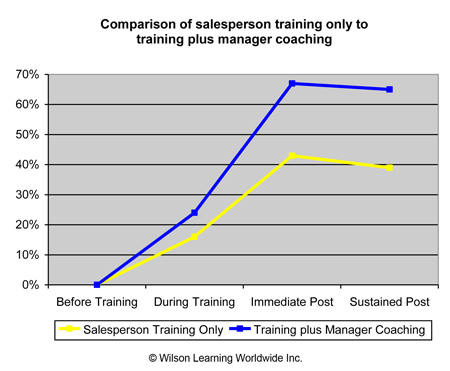For Increased Sales Performance
Invest in Manager Training
Executive Summary
High-performing sales organizations are typically willing to invest in training to ensure salespeople have the skills needed for success. Both research and experience support the belief that training can improve salespeople’s performance. Training for their managers, however, is usually a lower priority, especially when it is focused on coaching and performance management skills. Even though there is a general recognition that managers need to support and reinforce sales training, the assumption seems to be that a) they are already sufficiently skilled to do so, or b) the impact of coaching skills on training is not critical enough to warrant additional investment.
To date, very little research has been done to challenge these assumptions, with the result that there has not been much solid data to show what impact sales managers have on sales training effectiveness, or what particular skills are required to ensure optimal results. In our current study, we explore these questions, with some surprising findings.
First, the study shows that the impact of sales training is much more dramatic when supported by sales managers who know how to coach to and support the new skills. Specifically, we found that sales training is 24% more effective when accompanied by training for sales managers.
Our research goes on to show that sales managers need more than just generic coaching skills. To be fully effective, they need the ability to coach to the specific sales skills and processes their salespeople learn. Sales managers who have both general coaching skills and skills for coaching to the specific new knowledge of their salespeople can have more than twice the impact on performance as managers with generic coaching skills only.
This study shows that an organization can create greater and more sustained performance improvement by moving toward a process that involves the whole organization and away from training salespeople alone.
Moving from training to a development system
It is an experience common to every traditional sales training effort. Salespeople leave a training seminar armed with a new selling perspective and skills that they are ready to use, but return to the same, unchanged sales environment where the new skills are not supported. Their managers don’t know how to support salespeople in applying the new skills, nor how to assess how well the skills are being used.
Sales executives are caught in a conundrum. In a recent survey, we asked a select group of sales executives what action is most important to improving sales performance; 88% indicated “making sales managers more effective,” a finding consistent with a survey conducted by the Sales Executive Council. In addition, we asked what manager skill is most critical; 91% answered “coaching and providing feedback to salespeople.” However, when asked how well prepared their organization is to address these skill needs, over 50% indicated that they are not well prepared. The primary difficulty, according to sales executives, is lack of good evidence that the effort justifies the investment.
In our discussions with sales executives, two critical questions keep emerging:
- How much of an improvement in performance can we obtain by including manager coaching as part of our development system for salespeople?
- What are the skills most critical for managers to have, and is it enough to just give them generic coaching skills, or is more required?
To answer these questions we initiated two research projects—one focused on quantifying the impact of manager coaching skills on sales performance improvement, and the second to identify the specific skills with the greatest impact.
Quantifying the impact of manager coaching on sales performance
We had an opportunity to study the impact of manager coaching in a large U.S. travel services organization, using our Counselor Salesperson development technology. The organization allowed us to divide the sales force of 246 salespeople and managers into two groups:
- Salesperson Training Only: One group of salespeople received a two-day training program designed to teach Counselor Salesperson skills. (A full description of The Counselor Salesperson program is available upon request.)
- Salesperson Training plus Manager Coaching: The other group of salespeople also received the Counselor Salesperson training. But in addition, their managers received training on how to coach using the same Counselor Salesperson process the salespeople learned, and how to monitor the implementation of the skills.
The salespeople in the two groups were equivalent in age, sales experience, and sales productivity before the training began. Therefore, any changes in performance over the course of the study were due to the training and not to differences in the salespeople themselves.
Performance Measure
We used sales revenue to determine the impact of the training on sales performance. This data was collected over an 18-month period. We grouped the data into four reporting periods:
- Before Training: the six months just prior to the launch of the training
- During Training: the three months during which all 246 participants were trained
- Immediate Post-training: the first three months after training was completed for everyone
- Sustained Post-training: the fourth through sixth months after training was completed

Findings
Since actual revenue results cannot be shown (to protect the proprietary information of the organization), results are shown as the percent of improvement compared to the pre-training baseline.
The graph clearly shows that manager coaching has a great impact on performance over and above the impact of training alone. While just training the salespeople resulted in a 43% improvement in performance, when manager coaching was added, overall performance improved 67%, a 24% improvement over training alone. In addition, as the graph shows, with training alone there was a 6% drop in performance from the Immediate to the Sustained post periods (from 43% to 39%), while there was only a slight drop (less than 2%) with the manager coaching, suggesting that not only did manager coaching improve performance, but it will sustain that performance longer.
What this means for you: the ROI of manager coaching
What does this mean for you? While every organization is different, if you assume that your results will be similar, you can easily estimate whether training your managers to coach to the new skills of their salespeople will produce a positive return on that investment. All you need to do is:
- Take your total revenue and multiply by 24% (Revenue × .24). This is the “return” you receive from training the managers because the managers add 24% over the return from salesperson training alone.
- Calculate the total costs of training the managers (Costs). Then apply this simple formula:
![]()
If the resulting number is greater than one, then you have a greater return from training your sales managers than you have costs to train them. For example, the organization in this study had revenues of approximately $20 million in the previous year. Twenty-four percent (24%) of $20 million is $4.8 million. This would be the expected return from training their sales managers. They estimated the costs of training their 40 sales managers at about $2000 per manager, or $80,000.
Applying the formula above:
![]()
Thus, the return to this organization was $59 for every $1 they spent on training the managers. By any accounts, this is a significantly positive ROI.
What skills produce the greatest impact?
In the study described above, the managers received rather extensive development. They participated in the same Counselor Salesperson program as their salespeople, so they would have intimate knowledge of the skills. In addition, they participated in two days of training on both coaching skills and on specific methods for coaching to the Counselor Salesperson skills.
Is all of this necessary to create a positive ROI? The above study alone cannot answer that question. So we examined the scientific research on the performance impact of manager coaching. We were able to identify eight studies that provided percentage improvement in performance statistics. In examining these studies, it was clear that they could be classified by the type of manager coaching delivered into three groups:
- Motivation Group: In these studies, the company encouraged managers (through incentives) to coach their employees, but no training was provided.
- Generic Coaching Skills: In these studies, the company provided managers with generic coaching skills.
- Specific Coaching Skills: In these studies, like the study above, managers were provided with coaching skills specific to the content being delivered to their employees so they could provide targeted coaching and support.

As the graph shows, while generic coaching skills had a meaningful impact on performance improvement, the inclusion of specific coaching skills more than doubled the impact over generic coaching skills. Thus, if providing additional manager development is less than double the costs of providing generic coaching skills only (which, in most cases, will assuredly be so), then you significantly improve the return on investment if you train managers not just to coach, but to coach to the specific skills their people are learning.
Conclusions
We can draw three conclusions from this research:
- Providing sales managers with coaching skills will increase the impact of sales training significantly. While each organization is different, you could expect about a 24% improvement in performance over the impact of sales training alone.
- The more specific the training a manager receives, the higher the return in improved performance. The greatest impact comes when managers are trained to be effective coaches and are provided with the ability to coach to the specific skills their salespeople are receiving.
- While each organization will experience different results, you can estimate the Return on Investment (ROI) for manager coaching with this formula:
![]()
While the concept of training sales managers to coach to the specific skills their salespeople are learning is not new, many organizations are reluctant to make the investment. This has largely been due to the difficulty of justifying the expense. The studies reported here provide clear and convincing evidence that sales manager training produces a positive ROI. That is, the costs of sales manager training added only about 20% to the costs of sales training, but produced a 59% (59:1) ROI for the organization.







 Please complete this form to download For Increased Sales Performance | Invest in Manager Training.
Please complete this form to download For Increased Sales Performance | Invest in Manager Training.



